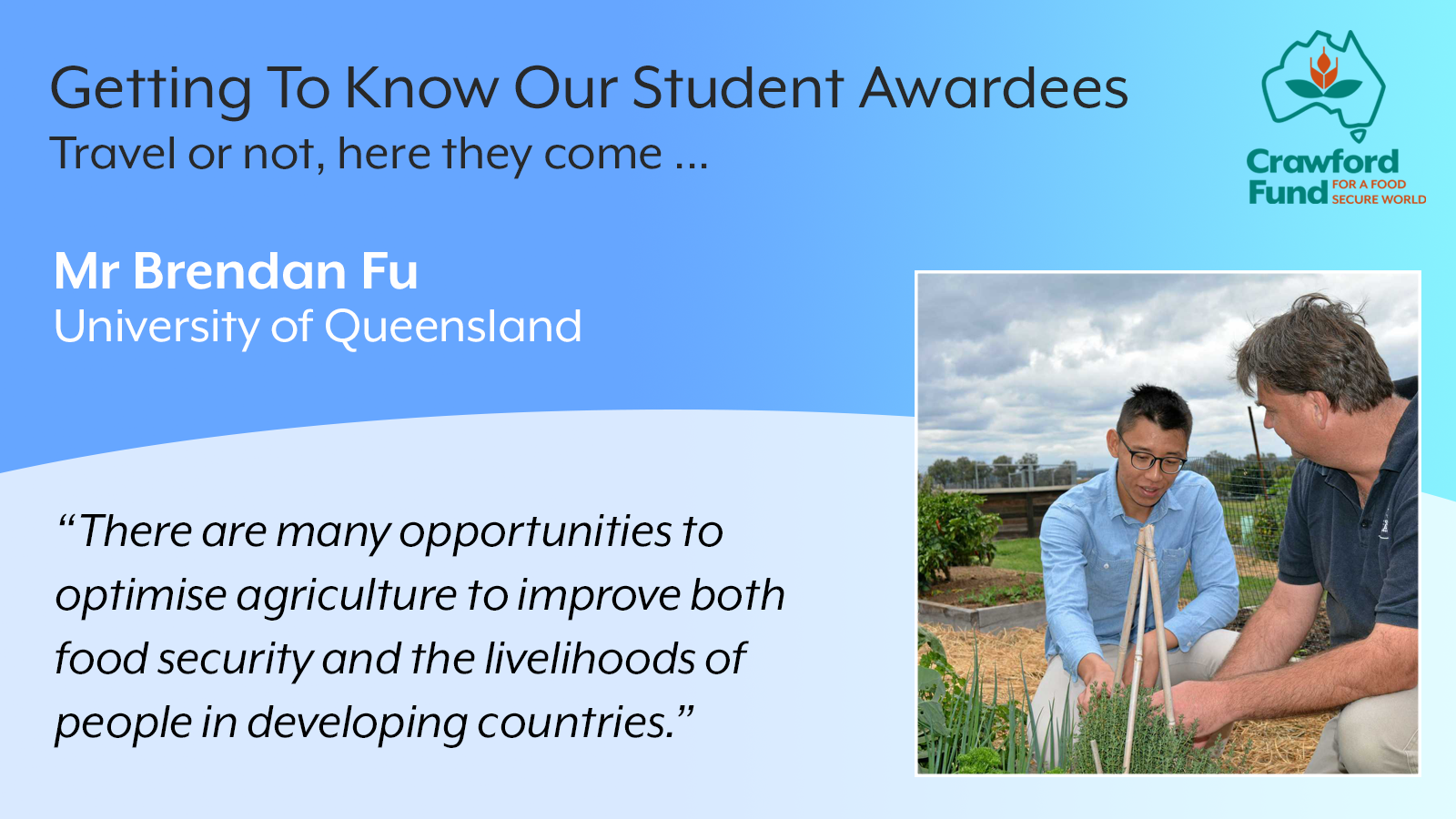

Getting to know our Student Awardees – Brendan Fu, The University of Queensland
March 2, 2022

Last year we announced our 2021 Student Awardees – those talented students from around Australia selected by our State and Territory Committees to experience international agricultural research and development firsthand, in a COVID safe manner of course!
The 2021 recipients will carry out research across a diverse range of topics, focused in Australia, Laos, Uruguay, Vietnam, Fiji, Mexico, Samoa, Uruguay, Malaysia, Brazil, Nepal and Myanmar. We would like to thank our partner organisations for making these opportunities available, including the Australian Centre for International Agricultural Research, Grains Research and Development Corporation, International Maize and Wheat Improvement Center (CIMMYT), and the Sunrice Rice Research Facility.
We are excited to now bring you more details of each of our Awardees, their projects, and what they hope to achieve with the opportunity provided by our support. We are pleased to also provide input from our awardees’ supervisors on what they see as the benefit of the opportunity to add an international component to their student’s studies and research.
Presenting:
Brendan Fu
PhD
The University of Queensland
Research: Modelling fertiliser usage efficiency to increase productivity for plantation crops
How did you become interested in international ag for development and focusing your research in developing countries?
There are many opportunities to optimise agriculture to improve both food security and the livelihoods of people in developing countries. Malaysia’s agricultural industry is teeming with talented researchers and industrialists who want to make a difference. More needs to be done to bridge the gap between them.
Have you had any former experience in ag for development?
I founded a company that develops micro-algae based food products while integrating climate change remediation outputs to enhance soil health.
Are there benefits to Australia from the proposed award work?
In the past decade, studies on the Great Barrier Reef have resulted in conflict between the agricultural industry in Queensland (e.g. banana and sugarcane) and the continued conservation of the Great Barrier Reef. At the same time, fertiliser prices have broadly risen, negatively impacting profitability and productivity. In order to safeguard our natural heritage and increase productivity for farmers, a practical means of monitoring fertiliser usage onsite is necessary.
The use of multiple data layers (soil, canopy, satellite, hyperspectral etc.) to correlate plant growth information to fertiliser application rates can calculate efficiency ratios and losses into coastal basins. Subsequently, this allows farmers and industry to design better application methods/schedules to mitigate such losses.
This Crawford Fund student award will aid in the development of a fertiliser efficiency model that could also be used by Queensland farmers growing horticultural crops such as bananas and sugarcane, to minimise spill-on environmental effects. We can subsequently adapt the model for major plantation crops in Queensland, by accounting for different parameters such as crop requirements, soil types, cultural practices and climate etc. This will strengthen research relationships and likely result in further collaborations between Malaysian and Australian partners. For instance, replicating the soil and canopy work done in Malaysia on Queensland plantations will require consultation with Malaysian academic and industry partners involved in the development of the base model.
Please tell us about what you hope to do as part of your award and the impact it may achieve.
This Crawford Award will provide funding for overseas engagement with industry and academic partners in Malaysia. Through this trip, the goal is to exchange best practices on data collection and sensor calibration under the context of outdoor plantation environments. In addition, another key outcome is to learn from partners well-versed in machine learning protocols. We would also work together on the integration of such data into machine learning models developed by them. The goal is to enhance profitability and sustainability of plantation crops in in Malaysia and Australia.
Do you have a strategy to carry out the award research, even if travel is not possible, that you’d like to share with other awardees?
Due to the uncertainties associated with international travel at the moment, it may be possible that the borders remain closed at the proposed visit period. It is possible to delay the field work to when borders re-open, alternatively, our partners over in Malaysia may proceed with the field work without me. In that case, we have organised contingency plans that include: weekly zoom meetings, remote and lab-based work for sensor calibration, cleaning and training of datasets performed remotely.
What do you want to be working on in the future?
I would like to develop remote sensing technologies for outdoor agriculture and automated urban farming systems.
Do you have advice for others interested in getting involved in international ag development?
Find an area that you are passionate about and contact the relevant experts in this field.




